Editor’s Note: This is the fifth installment of a series looking at the newest iteration of the proposed Winsor Avenue solar farm. The public hearing is expected to continue in January, with a likely vote on a special-use permit to build an industrial-scale 19-megawatt (MW) solar field, with nearly 50,000 solar panels at 118 Winsor Ave. in northwest Johnston. Watch for more coverage leading up to and following the expected continuation of this hearing on Jan. 25.
This item is available in full to subscribers.
We have recently launched a new and improved website. To continue reading, you will need to either log into your subscriber account, or purchase a new subscription.
If you are a current print subscriber, you can set up a free website account by clicking here.
Otherwise, click here to view your options for subscribing.
Please log in to continue |
|
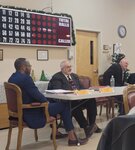

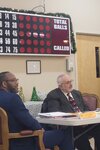
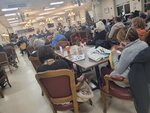
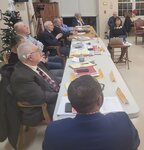
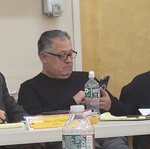
Editor’s Note: This is the fifth installment of a series looking at the newest iteration of the proposed Winsor Avenue solar farm. The public hearing is expected to continue in January, with a likely vote on a special-use permit to build an industrial-scale 19-megawatt (MW) solar field, with nearly 50,000 solar panels at 118 Winsor Ave. in northwest Johnston. Watch for more coverage leading up to and following the expected continuation of this hearing on Jan. 25.
The crowd looked up from the Zoning Board to the Bingo Board, as a former judge and local attorney issued a challenge.
“I’m going to be very brief,” said former Johnston Chief Municipal Court Judge and lawyer Jacqueline M. Grasso. “I listened to everybody. And everybody has the same opinion. We don’t want this. And I find it very interesting that there’s all men on this board.”
She pointed to the words printed on the giant illuminated Bingo sign hanging in the Johnston Senior Center ballroom, at the front of the room above the long Zoning Board table.
“And with that being said, I want you to look at those two words above your head,” Grasso said, steering the crowd’s eyes to two words, in all capital letters — “TOTAL BALLS.”
The crowd laughed first — it was a release following an evening full of tense discourse and debate over a massive proposed solar farm pitched for nearly 160 wooded acres in the town’s west end. The laughter was loud and therapeutic.
The zoning board members slowly turned around and looked up at the sign behind them. They couldn’t help but smile as they read the words. Grasso was daring them to be brave, to unite with their neighbors rather than the applicant, to risk being removed from the board if they displease the political forces opponents argue have been pushing the solar project behind the scenes.
“My hope is that you use those two words, and instead of ‘turtle sweeping’ or ‘turtle swapping’ you … stop this project please,” Grasso concluded. “Thank you.”
No Vote
The board ended the hearing on Thursday evening, Dec. 14, without a vote. Their legal counsel, Joseph Ballirano, suddenly left the meeting early with no announcement. The board members said they didn’t know where he went. After the meeting, Zoning Board Chairman Thomas Lopardo said Ballirano “might not have been feeling well.”
He was called out directly several times by those who rose to speak from the public. One man in the audience chastised the lawyer for using his cell phone throughout the night’s testimony, rarely looking at those speaking from the lectern.
Ballirano left the meeting multiple times throughout the evening, for up to 15 minutes at a time.
Last month, Green Development’s attorney John O. Mancini stormed out of the Johnston Senior Center before adjournment, effectively terminating the hearing.
“We got toward the end of the meeting, and as a resident of the town, I felt insulted,” Rollingwood Drive resident Raymond Arruda testified Thursday. “Not only for myself, for the rest of the people that are here tonight, for all of you, that the attorney for the applicant thought that it was his meeting … I was a little disappointed with the way he handled it. I hope tonight, and in any future meeting that he’s here representing the current applicant, that he acts a little bit more professional and doesn’t walk out on us like that.”
The audience offered applause to punctuate Arruda’s complaint. The resident then took aim at the town’s newly promoted, formerly part-time planner Thomas Deller, who gave the solar array application his blessing and clearing it for a series of lengthy public hearings.
According to Johnston Mayor Joseph M. Polisena Jr., Deller was promoted earlier this year to full-time employment with the town and now serves as both Town Planner and Director of the town’s Development & Public Services Department. His new annual salary is $95,000.
No Planner
Deller did not attend Thursday night’s meeting. The zoning board members said they had no idea why he wasn’t in attendance.
“We were told that we couldn’t talk for those first two meetings,” Arruda said. “And the person, Mr. Deller, who sat here for two meetings, is not here. And it baffles me that the person, I’m not sure if he’s our zoning official, our public works director, I’m not sure if he’s the mayor, but it really is baffling that Tom Deller is not here, sitting here so I can direct questions directly to him. I don’t expect you to all be experts. But representing our town, I would expect that he would be … Unless he has a family member that is very ill, or he’s ill himself, there is no reason … He should be ashamed of himself that he’s not here today.”
The residents said they wanted to make their case directly to the individual who helped clear the way for Green Development’s application. Deller allowed the applicant to re-apply less than two years after a larger-scale solar farm was pitched by the same company, for the same residentially zoned woodland.
Arruda told the board he had one query he wanted answered.
“My only question, really, is: Where is the hardship?” Arruda asked. “You come to zoning with a hardship. There is a request for a special-use permit to allow … under R-40, it is not a permitted use. If it was, none of us would be here for the last two years. This company, the applicant, is a for-profit company. They’re trying to buy an empty piece of land, and they’re trying to make money. Again, where is the hardship? There isn’t one.”
Arruda’s backyard borders the proposed solar farm. Despite a likely buffer, he’ll have a prime view of more than 46,000 solar panels, if the zoning board grants a special-use permit to Green Development.
“They come here … they insult us with hypotheticals,” Arruda said. “They tell us if we don’t, they’re going to cut the trees down anyway. We’re going to put something else there. They try to sell you and us on the fact that it will profit the town, versus homes. And again, it means nothing. It’s hypotheticals. If this was a good business endeavor for the town, why are we stopping at a solar farm? Why is Steere Farm not selling and us putting (in) a nuclear power plant? Why are we not putting (in) another dump? We could make some serious money if the town is trying to make money.”
Arruda urged town officials to listen to his neighbors.
“This is not a business endeavor,” he scolded. “The mayor seems to think the town of Johnston is a business. It’s not a business. If it were a business, and the business was running well, guess what? Taxes would go down. They’re not going down. I’ve been here my whole life and taxes are not coming down. Johnston is a rural community, with families, people, and I almost forgot, homes. The land is approved for residential, and that, in my opinion, is what it should be used for.”
In April 2022, the Johnston Zoning Board narrowly voted down a very similar, though larger proposal by Green Development. If the current proposal is approved, it may set a precedent, and applications for the rest of the previously pitched project may follow.
The Neighbors Object
Smithfield’s Town Manager Randy R. Rossi wrote and signed a letter, dated Nov. 21, to Johnston’s Zoning Board and Building Official Edward Civito in objection to the proposal.
“I am writing on behalf of the citizens of Smithfield who may be affected by the proposed solar project on Winsor Avenue,” Rossi wrote (he also copied Polisena and members of Smithfield Town Council on the correspondence). “As you might imagine, we have heard from many concerned residents in Smithfield and the northern part of Johnston about the potential impacts form this large solar project. While the Town has no jurisdiction over the approval of this project, we feel that we should express concern on behalf of our residents especially since a large portion of this project appears to be in the watershed of Slacks Reservoir which straddles the line between Johnston and Smithfield.”
Smithfield’s letter echoed concerns voiced by residents at Thursday’s hearing (and in 2022).
“Given the existing water quality concerns in Slacks Reservoir, it is essential that the wetlands on this property are protected and continue its function as a natural water quality filter for stormwater,” Rossi wrote. “It is also essential that design plans and all stormwater treatment systems are carefully reviewed and that peer review of all reports and designs are conducted on behalf of the Town.”
A project like that proposed for Winsor Avenue wouldn’t have a shot in neighboring Smithfield.
“In step with many other communities in the State, Smithfield has prohibited all large-scale solar projects in residential zones and will be focusing on directing solar development on brownfield sites and rooftops where possible,” Rossi explained. “We trust that all appropriate measures will be taken to thoroughly review the project and receive input from abutting residents.”
Mancini suggested the zoning board take more time, have the stenographer’s minutes transcribed, and allow the applicant to produce rebuttal witnesses to the night’s citizen testimony.
“Just to respond briefly to what Mr. Mancini’s suggestion was, to take time to have the transcripts provided, for three-four hearings, 20-plus hours of testimony — it’s going to take weeks,” said Stop Johnston Solar attorney Matthew Landry. “With all due respect to the court (reporter), it’s going to take a long, long time, and we’ll be lucky if we have another hearing by March.”
The residents shouted for a vote.
“It’s only going to prolong things, and I have never seen a proceeding where an applicant asks to have all the transcripts provided so they can provide more written testimony to the board so they can make the decision,” Landry argued. “More than enough testimony has come before this board. I think you’ve had ample time to consider it and ponder it. I have no objection to Mr. Mancini responding to the comments of the public; that’s well within procedure … But in terms of this business of waiting weeks to get the transcripts, and providing findings of facts and conclusions of law … it’s going to prolong things months. I don’t think it’s necessary.”
The crowd backed Landry’s argument with more applause.
The Johnston Zoning Board might have looked to their legal counsel for advice, though he had already left the building.
“I do want the opportunity to present rebuttal witnesses and I will file findings …” Mancini started, arguing for yet more time to present his applicant’s case, beyond the three four-hour hearings held already this year (and the epic 2022 meeting that drug on until 2 a.m.).
The crowd shouted Mancini down with cries of “no.”
“I’m trying to avoid a procedural error,” Mancini told the zoning board.
“You’re a walking procedural error,” one man yelled from the crowd.
“He walked out like he was the boss, and it wasn’t even over yet,” another man shouted. “And he wants to call the shots now. Don’t let him do it guys.”
Zoning Board member Richard Fascia made a motion to end the public comment portion of the meeting and continue the proceedings to the board’s regular meeting on Jan. 25.
Comments
No comments on this item Please log in to comment by clicking here